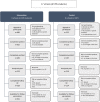A Media Literacy Education Approach to High School Sexual Health Education: Immediate Effects of Media Aware on Adolescents' Media, Sexual Health, and Communication Outcomes
- PMID: 35113295
- PMCID: PMC8811737
- DOI: 10.1007/s10964-021-01567-0
A Media Literacy Education Approach to High School Sexual Health Education: Immediate Effects of Media Aware on Adolescents' Media, Sexual Health, and Communication Outcomes
Abstract
Media may function as sex educators for adolescents; unfortunately, media messages often glamorize risky sexual behaviors and unhealthy relationships and neglect sexual health behaviors and communication. Media Aware is a web-based comprehensive sexual health program for high school students that uses a media literacy education approach. It is designed to improve adolescents' critical thinking about media messages and provide medically-accurate information and skills building related to sexual health and communication. A randomized controlled trial was conducted in 2019-2020 with students (grades 9 and 10; n = 590) from 17 high schools across the United States. The sample was 53% female, 58% white/Caucasian; and 13% Hispanic/Latinx. One high school teacher per school and all of their 9th and 10th grade students were randomly assigned to either the intervention or delayed-intervention (control) condition. The study assessed the immediate (posttest) and short-term (3-month) effects of Media Aware on adolescents' media, sexual health, and communication outcomes. For 9 of the 17 schools, students were home from school due to the beginning of the COVID-19 pandemic during the time of their 3-month data collection, which left the short-term analyses underpowered. However, several impacts of the program were found in the immediate posttest analyses. Media Aware was found to improve sexual health knowledge and redress inaccurate normative beliefs about the frequency of risky teen sex. Media Aware also improved critical thinking about media messages with demonstrated improvements in media message deconstruction skills and decreases in the perceived realism of media messages. Moderator analyses found some differential immediate effects of the program attributable to gender. Media Aware reduced girls' normative beliefs about teen sex, generally, and increased their sexual health communication with parents as well as reduced boys' acceptance of dating violence. Students gave positive feedback about Media Aware, especially related to the online format of the program. The results from this study provide evidence that Media Aware is an effective web-based program for positively enhancing high school students' media, sexual health, and sexual health communication outcomes.
Keywords: Adolescents; High School; Media Literacy Education; Relationships; Sexual Health; Sexual Health Communication.
© 2022. The Author(s), under exclusive licence to Springer Science+Business Media, LLC, part of Springer Nature.
Conflict of interest statement
The authors are employed by a small business. The business has a financial interest in the copyright and sale of the
Similar articles
-
Evaluating the Short-term Impact of Media Aware Parent, a Web-based Program for Parents with the Goal of Adolescent Sexual Health Promotion.J Youth Adolesc. 2019 Sep;48(9):1686-1706. doi: 10.1007/s10964-019-01077-0. Epub 2019 Jul 14. J Youth Adolesc. 2019. PMID: 31304562 Free PMC article. Clinical Trial.
-
Study protocol for a randomized controlled trial to evaluate a web-based comprehensive sexual health and media literacy education program for high school students.Trials. 2020 Jan 8;21(1):50. doi: 10.1186/s13063-019-3992-1. Trials. 2020. PMID: 31915060 Free PMC article.
-
Using Media Literacy Education for Adolescent Sexual Health Promotion in Middle School: Randomized Control Trial of Media Aware.J Health Commun. 2018;23(12):1051-1063. doi: 10.1080/10810730.2018.1548669. Epub 2018 Nov 23. J Health Commun. 2018. PMID: 30468408 Free PMC article. Clinical Trial.
-
School-based programs to reduce sexual risk-taking behaviors.J Sch Health. 1992 Sep;62(7):280-7. doi: 10.1111/j.1746-1561.1992.tb01244.x. J Sch Health. 1992. PMID: 1434554 Review.
-
Adolescents' perceptions of sexual health education programs: An integrative review.J Adolesc. 2020 Oct;84:96-112. doi: 10.1016/j.adolescence.2020.07.014. Epub 2020 Sep 4. J Adolesc. 2020. PMID: 32896710 Review.
Cited by
-
Promoting Comprehensive Sexuality Education in Pakistan Using a Cocreated Social Media Intervention: Development and Pilot Testing Study.JMIR Form Res. 2024 Dec 20;8:e52651. doi: 10.2196/52651. JMIR Form Res. 2024. PMID: 39705696 Free PMC article.
-
Conceptions of Consensual versus Non-Consensual Sexual Activity among Young People from Colombia.Behav Sci (Basel). 2024 Oct 1;14(10):884. doi: 10.3390/bs14100884. Behav Sci (Basel). 2024. PMID: 39457755 Free PMC article.
-
A Meta-Analysis of the Effects of Comprehensive Sexuality Education Programs on Children and Adolescents.Healthcare (Basel). 2023 Sep 11;11(18):2511. doi: 10.3390/healthcare11182511. Healthcare (Basel). 2023. PMID: 37761708 Free PMC article. Review.
-
Public's preferences for health science popularization short videos in China: a discrete choice experiment.Front Public Health. 2023 Aug 4;11:1160629. doi: 10.3389/fpubh.2023.1160629. eCollection 2023. Front Public Health. 2023. PMID: 37601206 Free PMC article.
-
Teaching methods for critical thinking in health education of children up to high school: A scoping review.PLoS One. 2024 Jul 18;19(7):e0307094. doi: 10.1371/journal.pone.0307094. eCollection 2024. PLoS One. 2024. PMID: 39024294 Free PMC article.
References
-
- Ajzen I. The theory of planned behavior. Organizational Behavior and Human Decision Processes. 1991;50:179–211. doi: 10.1016/0749-5978(91)90020-T. - DOI
-
- Ajzen, I., & Fishbein, M. (1975). Belief, attitude, intention, and behavior: an introduction to theory and research. Reading, MA: Addison-Wesley.
-
- Alexopoulos C, Taylor LD. Risky business: sexual risk and responsibility messages in teen sex romps. Sexuality & Culture. 2020;24(6):2161–2182. doi: 10.1007/s12119-020-09742-4. - DOI
-
- Aufderheide, P. (1993). Media literacy. a report of the national leadership conference on media literacy.
Publication types
MeSH terms
LinkOut - more resources
Full Text Sources
Medical


